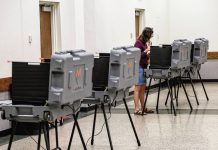Columbus Regional Health is keeping its eye on a more contagious coronavirus strain that has been confirmed in Bartholomew County and blamed for overwhelmed hospitals in southwest Missouri.
The delta variant, which was initially detected in India, is believed to be about 50% more transmissible than other strains and has already been reported in more than 80 countries, The Associated Press reported.
The Centers for Disease Control and Prevent says the delta variant now accounts for about 1 in 4 cases of COVID-19 in the U.S, up from 1 in 10 cases in early June.
Currently, at least 196 cases of the delta variant have been detected in Indiana, up from 39 cases two weeks ago, according to the Indiana State Department of Health.
On Thursday, Bartholomew County Health Officer Dr. Brian Niedbalski confirmed that there has been more than one case of the delta variant in the county and expects the strain to become the most common variant in the United States in the coming weeks.
It’s not yet clear whether the variant makes people sicker, but a recent research done in Scotland, where the variant is already the most dominant strain, suggests that it might increase the chances of hospitalization.
However, studies have shown that the COVID-19 vaccines available in the United States work against the delta variant and other strains that are currently circulating.
“That’s something we’re watching,” said Dr. Slade Crowder, Columbus Regional Health vice president of physician enterprise operations and associate chief medical officer. “I’m not alarmed yet, but it’s something we’re keeping our eye on.”
On edge
The variant has some health officials on edge across the country, particularly those in areas with low vaccination rates or where cases are starting to rise after toppling from a surge this past winter that killed at least 217,500 people in the U.S., including at least 55 in Bartholomew County.
Last week, officials in Los Angeles County recommended that fully vaccinated people resume wearing face coverings indoors after detecting that about half of all cases there were the delta variant, The Associated Press reported.
Officials in Kansas also have launched public-service announcements reflecting fears that people who travel during the Fourth of July holiday will bring the variant back to the state, according to wire reports.
Niedbalski said he doesn’t expect any changes to mask guidance in Bartholomew County “unless we see a dramatic increase in cases in our area.”
However, local health officials remain optimistic that vaccinations will prevent hospitalizations that overwhelmed CRH this past winter, even though tens of thousands of eligible residents have yet to be fully vaccinated.
British researchers have found that two doses of the Pfizer-BioNTech vaccine were only slightly less effective at blocking symptomatic illness from the delta variant than from earlier mutations — and importantly, remain hugely protective at preventing hospitalization, according to wire reports.
Experts say the Moderna vaccine, the same type as Pfizer’s, should be similarly protective.
Johnson & Johnson announced late Thursday that its one-dose shot also protects against the delta variant, citing lab tests of vaccine recipients’ blood. In a news release, the company said the immune response lasts eight months and counting.
“I’m optimistic that we will not have another surge like we did in December,” Crowder said. “But, that said, if cases go back up, absolutely we are talking about how we would staff, our (personal protective equipment) and making sure we’re prepared if that were to happen.”
Other surges
The mutation is also causing concern even in countries with relatively successful immunization campaigns that nonetheless haven’t reached enough people to snuff out the virus, according to wire reports.
For instance, the variant has forced the United Kingdom — which has a slightly higher vaccination rate than Bartholomew County — to postpone for a month its long-anticipated lifting of COVID-19 restrictions, as cases are doubling about every nine days, according to wire reports.
The delta variant also has been blamed for a surge in COVID-19 cases in southwestern Missouri, with health officials there saying hospitals have been filling up with coronavirus patients at faster rates than at any point during the pandemic, The St. Louis Post-Dispatch reported.
On June 17, Erick Frederick, chief administrative officer at Mercy Hospital Springfield, tweeted that “bed capacity is strained. (Emergency Department) waits are long. COVID patients are younger, sicker and unvaccinated.”
In mid-May, hospitalizations at Mercy Hospital Springfield were averaging in the teens, Frederick told The St. Louis Post-Dispatch. Within a month, hospitalizations had reached 50 — and then they shot up by another 22 in a matter a few days, reaching a total of 72 on June 17.
Currently, most of the hospitalizations in southwestern Missouri are adults under 40 who never got vaccinated, according to wire reports. Four children ranging from a few months old to 18 years were hospitalized with COVID-19 at Mercy Hospital Springfield, Frederick tweeted Thursday.
Vaccination push
The spread of the delta variant has added urgency to the push to vaccinate as many people as possible, with health officials attributing the surge of case in Missouri to low vaccination rates.
As of Thursday, 33.4% of Greene County, Missouri residents — where Springfield is located — were fully vaccinated, according to the Missouri Department of Health & Senior Services.
While that is considerably lower than in Bartholomew County, where about 46% of the total population was fully vaccinated as of Thursday, it’s right in line with, or higher than, several counties in CRH’s service area, which includes Bartholomew, Brown, Decatur, Jackson, Jefferson, Jennings, Johnson, Ripley, Scott and Shelby counties.
As of this past Tuesday, just 30% of Jennings County residents were fully vaccinated — including two-thirds of residents age 65 and up, 21% of residents age 25 to 44 and about 13% of residents age 12 to 24, according to data and population estimates from the Indiana State Department of Health, U.S. Census Bureau and STATS Indiana.
In addition, barely one-third of people in Ripley and Scott counties are fully vaccinated. And vaccination rates aren’t much higher in Decatur and Jackson counties, where about 38% and 39% respectively were vaccinated as of Tuesday.
Overall, an estimated nearly 16,000 people age 65 and up in CRH’s service area were not fully vaccinated as of this past Tuesday.
Patients age 60 and up have accounted for about 61% of COVID-19 hospitalizations in Indiana over the course of the pandemic, according to the Regenstrief Institute.
Health officials around the country have warned that a resurgence of COVID-19 could happen anywhere vaccinations rates are low, but local officials hope that more and more people will decide to get vaccinated, particularly as local doctor’s offices start receiving doses of the shots in the coming weeks.
“I hope we can continue to convince people that the vaccine is safe and effective and that COVID does pose a real risk to people who might not think it poses a risk to them,” said Crowder, who added that he is fully vaccinated. “I think there’s a misconception that if you’re young and catch COVID, it won’t hurt you. We have younger people being hospitalized (nationally). …Every (hospital) admission we have, it’s just unfortunate at this point, and I hope that we can continue to convince more people to get vaccinated.”
“It’s probably not a question of if (unvaccinated people) will get COVID, but when will you get COVID because it’s still spreading and going around,” Crowder added.
— The Associated Press contributed to this report.
[sc:pullout-title pullout-title=”Where to learn more” ][sc:pullout-text-begin]
Visit www.cdc.gov/coronavirus/2019-ncov/variants/variant-info.html for more information about the delta variant and other strains of the virus that causes COVID-19.
[sc:pullout-text-end][sc:pullout-title pullout-title=”How to get vaccinated” ][sc:pullout-text-begin]
Visit ourshot.in.gov for more information about how and where to get vaccinated.
[sc:pullout-text-end]




